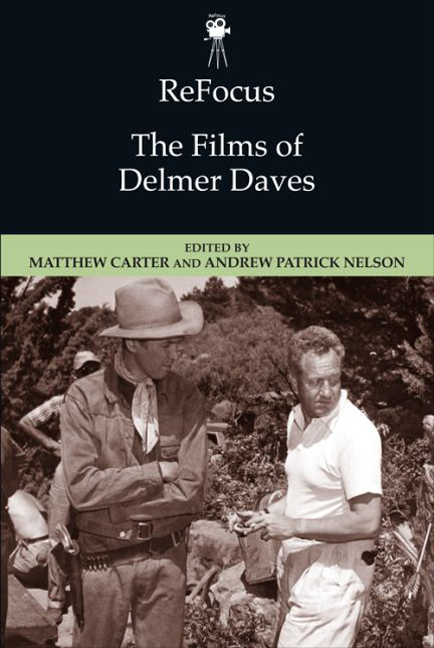Book contents
- Frontmatter
- Contents
- List of Figures
- Notes on Contributors
- Acknowledgments
- Introduction: “No One Would Know It Was Mine”: Delmer Daves, Modest Auteur
- 1 Don't Be Too Quick to Dismiss Them: Authorship and the Westerns of Delmer Daves
- 2 Trying to Ameliorate the System from Within: Delmer Daves’ Westerns from the 1950s
- 3 Bent, or Lifted Out by Its Roots: Daves' Broken Arrow and Drum Beat as Narratives of Conditional Sympathy
- 4 This Room is My Castle of Quiet: The Collaborations of Delmer Daves and Glenn Ford
- 5 Delmer Daves, Authenticity, and Auteur Elements: Celebrating the Ordinary in Cowboy
- 6 Home and the Range: Spencer's Mountain as Revisionist Family Melodrama
- 7 Delmer Daves’ 3:10 to Yuma: Aesthetics, Reception, and Cultural Significance
- 8 Changing Societies: The Red House, The Hanging Tree, Spencer's Mountain, and Post-war America
- 9 Partial Rehabilitation: Task Force and the Case of Billy Mitchell
- 10 “This Is Where He Brought Me: 10,000 Acres of Nothing!”: The Femme Fatale and other Film Noir Tropes in Delmer Daves’ Jubal
- Index
1 - Don't Be Too Quick to Dismiss Them: Authorship and the Westerns of Delmer Daves
Published online by Cambridge University Press: 15 September 2017
- Frontmatter
- Contents
- List of Figures
- Notes on Contributors
- Acknowledgments
- Introduction: “No One Would Know It Was Mine”: Delmer Daves, Modest Auteur
- 1 Don't Be Too Quick to Dismiss Them: Authorship and the Westerns of Delmer Daves
- 2 Trying to Ameliorate the System from Within: Delmer Daves’ Westerns from the 1950s
- 3 Bent, or Lifted Out by Its Roots: Daves' Broken Arrow and Drum Beat as Narratives of Conditional Sympathy
- 4 This Room is My Castle of Quiet: The Collaborations of Delmer Daves and Glenn Ford
- 5 Delmer Daves, Authenticity, and Auteur Elements: Celebrating the Ordinary in Cowboy
- 6 Home and the Range: Spencer's Mountain as Revisionist Family Melodrama
- 7 Delmer Daves’ 3:10 to Yuma: Aesthetics, Reception, and Cultural Significance
- 8 Changing Societies: The Red House, The Hanging Tree, Spencer's Mountain, and Post-war America
- 9 Partial Rehabilitation: Task Force and the Case of Billy Mitchell
- 10 “This Is Where He Brought Me: 10,000 Acres of Nothing!”: The Femme Fatale and other Film Noir Tropes in Delmer Daves’ Jubal
- Index
Summary
Delmer Daves’ 1950 film Broken Arrow is credited in histories of the Western genre with inaugurating a cycle of “pro-Indian” (or “liberal” or “adult”) Westerns that began in the early 1950s and lasted until the early 1960s. Based on true events, the film follows former Army Scout Tom Jeffords (played by James Stewart) as he is initiated into the Chiricahua Apache tribe led by the respected chief Cochise (Jeff Chandler). Overcoming bad actors on both sides of the racial divide and the murder of his Apache wife, Sonseeahray (Debra Paget), Jeffords ultimately brokers a peace treaty between the Apache and the U.S. Government.
Though Broken Arrow was not the first post-war Western to take a compassionate view of American Indians—consider John Ford's Fort Apache from 1948 and She Wore a Yellow Ribbon from 1949—the film initiated a wave of Indian-themed films in the 1950s and 60s, the majority of which, as Edward Buscombe has observed, offer a positive interpretation of Indian history and culture (within, of course, the limits of generic constraints). Like most Westerns of the period, Broken Arrow takes liberties with its representation of people and events from American history. This includes the portrayal of its Indian protagonist, Cochise, who is, among other things, played by a Caucasian actor—in accordance with Hollywood's standard casting practices.
Broken Arrow and the films that followed it, including titles like Apache (Robert Aldrich, 1954), Broken Lance (Edward Dmytryk, 1954), White Feather (Robert D. Webb, 1955), Run of the Arrow (Samuel Fuller, 1957), Flaming Star (Don Siegel,1960), and Cheyenne Autumn (John Ford, 1964), featured sympathetic, and at times heroic, portrayals of Indian characters as well as attempts to portray Indian customs with a greater degree of authenticity and detail. In Broken Arrow the Apache are depicted, accurately, as residing in wikiups rather than in tipis. The narrative includes the depiction of Apache customs, including the girls’ puberty rite and the social dance, which is performed by members of the White Mountain Apache Tribe of Arizona's Fort Apache Reservation. The Apache characters also speak in standard (if formal) English, a significant change from Indians speaking in broken, pidgin English, as was conventional at the time.
- Type
- Chapter
- Information
- ReFocus: The Films of Delmer Daves , pp. 48 - 62Publisher: Edinburgh University PressPrint publication year: 2016



